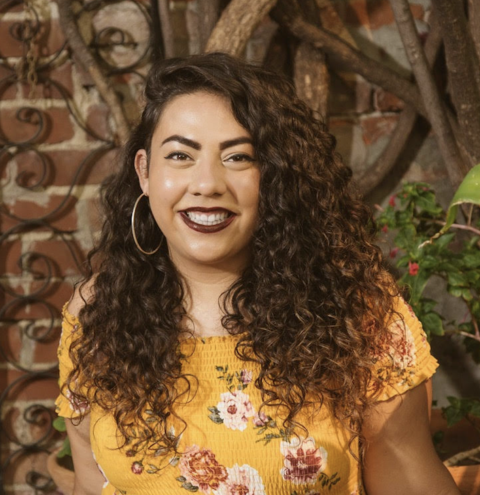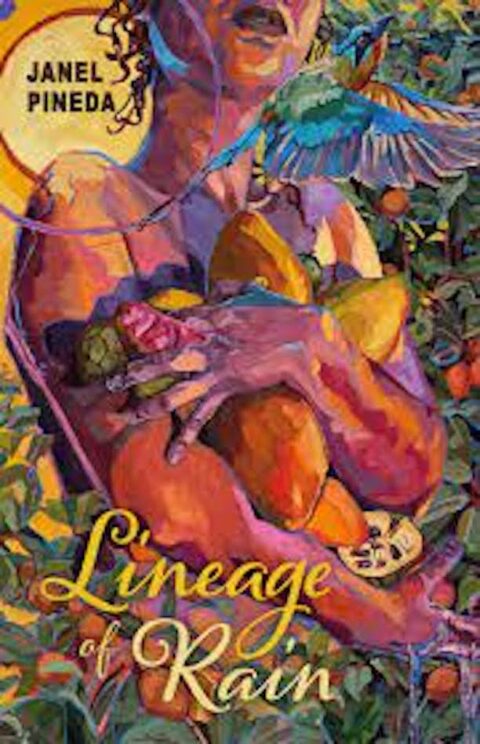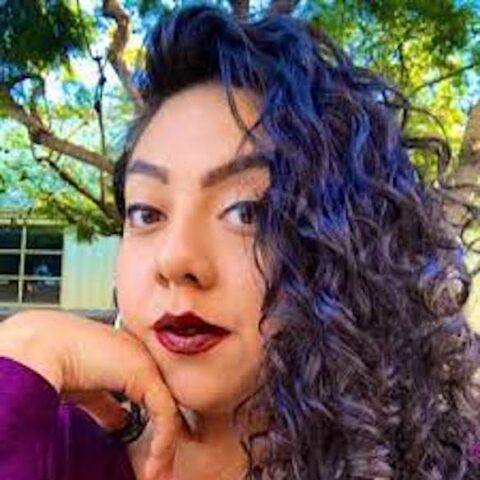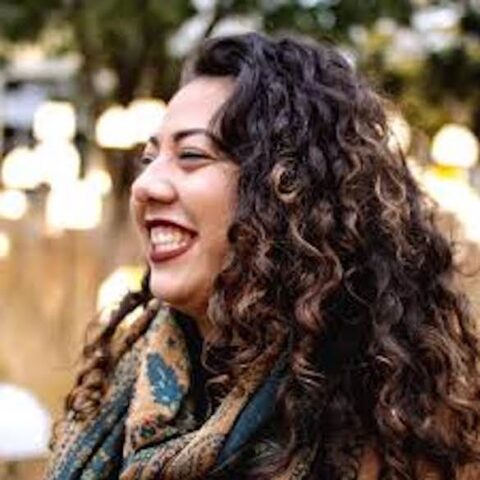A Conversation with Janel Pineda
Janel Pineda is a Salvadoran-American poet living in Los Angeles, CA. Her debut chapbook, Lineage of Rain, is part of Haymarket Books’ LatiNEXT series, which highlights the rising generation of Latinx voices across the United States. Her work has been featured in many journals and anthologies including PANK, Wildness, Literary Hub, and The Wandering Song: Central American Writing in the U.S. As a Marshall Scholar, she holds an MA in Creative Writing and Education from Goldsmiths, University of London. She was interviewed in May 2021 by Alan Chazaro.
Alan: I think of Lineage of Rain as an urgent meditation on generational trauma, cultural disconnect, and the burdens of gender — all tied into family, El Salvador, and the United States. What initially inspired your writing of these poems, and what were you aiming to achieve with this debut?
 Janel: A big part of writing this chapbook was wanting to see stories like mine represented, but also to learn what those stories even are. There’s so much silencing around histories of war and migration, such that many times these stories aren’t spoken or shared. The silence creates a further trauma where we aren’t able to speak about what happened and have to find ways to heal collectively.
Janel: A big part of writing this chapbook was wanting to see stories like mine represented, but also to learn what those stories even are. There’s so much silencing around histories of war and migration, such that many times these stories aren’t spoken or shared. The silence creates a further trauma where we aren’t able to speak about what happened and have to find ways to heal collectively.
I learned about my family’s history and experiences through historical research — by visiting El Salvador and interviewing people there, by reading Salvadoran literature, and eventually by finding ways to talk to family about it. Research was an important part of the process, but its limitation is the lack of personal elements. That’s where poetry and creative work intervenes. With poetry, we can understand the history of a place and its people but through the lens of story. I wanted to learn the history of my body by asking these questions and looking for answers. All of this led me to reflect on my journey and how lineages have shaped who I am and how I’ve moved through the world.
Alan: In my view, Central American diasporas often get overshadowed or unfairly conflated with Mexican culture. But your poems work against that simple stereotype by amplifying your Salvadoran roots and LA upbringing with vivid specificity. What are some influences and memories from El Salvador that have informed and shaped your identity as a proud salvadoreña?
Janel: Growing up, I internalized a lot of shame around being Salvadoran. Poetry became a space that allowed me to claim this part of my identity, explore it further, and take pride in the people and place I come from.
I wanted to find joy in being Salvadoran. A lot of this joy comes through memories of food — there are fruits like mamey and anonas that I remember trying in El Salvador as a kid and loving them. In my poem, “In Another Life,” — which imagines a world for Salvadorans without a history of violence, — part of the violence I’m addressing is poverty, starvation. It was important to me that this new world I imagined was one of abundance — where the only language of violence in the poem is actually representing nourishment — “disappearing” food into our bellies, pulling the “veins” of a fruit from our teeth.
I also made a point to represent foods that were important culturally, like pasteles. I think about how our quesadilla in El Salvador isn’t the same quesadilla that Mexicans would imagine. For us, it’s a pan dulce typically served with coffee. My grandma makes fun of me when I ask for Mexican quesadillas. She says, “Those aren’t quesadillas, those are tacos de queso!” (laughs).
Alan: I didn’t know that! But I did notice the fruit and the role of women. The tenderness of womanhood is often shown in contrast to the toxicity of manhood in your writing. “When the Men Come Looking” and “When the Death Squads Come,” for example, highlight a violent tension between male and female experiences in Central America, while the cover depicts a naked woman caressing an armful of tropical fruit.
 Janel: My poems focus on women because women are the storytellers in my family. There’s a beauty in having stories passed down through a lineage of women, in thinking about how stories have been crucial to Salvadoran women’s survival. So many of the stories my grandmother told me as a kid were often warnings, messages of safety and survival.
Janel: My poems focus on women because women are the storytellers in my family. There’s a beauty in having stories passed down through a lineage of women, in thinking about how stories have been crucial to Salvadoran women’s survival. So many of the stories my grandmother told me as a kid were often warnings, messages of safety and survival.
Poems like “When the Men Come Looking” allowed me to reclaim La Siguanaba, a mythic figure who takes many forms across Central American mythologies, but in my understanding was always depicted as a haunting figure meant to keep men in check. I wanted to reclaim her as a protector of women, as someone who emboldens us to take care of ourselves, someone who is a symbol of our strength.
Alan: Water represents another prominent symbol in your poems — it’s in the chapbook’s title, but it’s also flooded onto the pages in various forms — crying, rivers, rainfall, deluges, and drowning. In “Rain,” the speaker admits that when it rained during her childhood, she would run inside and cry, and the closing stanza ends with, “women leave / the second they suspect / a flood.” What does the fear of water represent, especially since it’s also portrayed as a source of life? At what point did you realize water would become the major thread and a part of the title?
Janel: Rain and water naturally recurred in my poetry. As I was thinking about the title, I kept coming back to those images. Rain felt like an origin story. My grandmother used to tell me it was why she migrated — because how else would you explain fleeing a war to a child? I wanted water and rain to shift throughout the book and show how it transforms from warning to healing. The final poem is a vision of a green future. In order to have that, we need water to create that world. That metaphor allowed me to employ the power of rain as origin and as a potential for change.
Alan: The problem with chapbooks is that sometimes they can’t accommodate as much you want. I’m curiou — is there anything you feel that this book might be lacking, or an area where you realized you want to continue exploring through future writings?
Janel: This is very much a beginning to a lot of stories I want to tell. There was such an urgency with these stories — and I now feel like I have more permission to explore beyond that. There are a few threads that I want to follow through on — like exploring La Siguanaba.
Alan: It seems that the first section is based more deeply in family stories and ancestry, while the second is more forward-looking and grounded in the speaker’s daily realities. Why the two sides?
 Janel: The sections are aligned with the opening and closing poems. The opening poem looks to the past and tries to reimagine that, while the final poem is not concerned with the past, but is looking at the future. I think we need both in order to move forward. We need to be able to understand the past and how it shapes us and we also need the freedom to dream about a world we want to see.
Janel: The sections are aligned with the opening and closing poems. The opening poem looks to the past and tries to reimagine that, while the final poem is not concerned with the past, but is looking at the future. I think we need both in order to move forward. We need to be able to understand the past and how it shapes us and we also need the freedom to dream about a world we want to see.
The first section grapples with family histories and the Salvadoran Civil War, and also language, more directly. The second half is more concentrated in the speaker’s present challenges. There was an effort to have those components in dialogue and sort of trace the lineages from the first section into the second one. That organization happened at the end of the process for me. You don’t always know what you’re saying until you’ve said it.
Alan: There are so many representations of intimate loss in your chapbook — from the stories your tios won’t tell you, to the confessions your tias openly share. How do you write about something so complex — like personal tragedies and national — in a way that fulfills your purpose as an artist, but also honors what family members have shared with you? It’s like balancing your truth, with their truth, and historical truth, isn’t it?
Janel: Every poem is a version of the truth. But at the end of the day everyone will have their own, unique truths for how they remember, were moved, or changed by something. I see my job as knowing my most intimate truth. If I’m sharing a story about a family member, I need to be honest with myself about my relationship to that story and how I can honor it, even when it’s not something I directly experienced. I’ve grappled with this a lot because I want to recognize the ways intergenerational storytelling shapes us, the way other’s lives and experiences interweave with our own.
Alan: How has your family responded to the book?
Janel: There’s been a healing element in sharing these poems with family, and I think it’s meant a lot to them to see our stories on the page. And there are also the funny moments where they’ll point out things I left out or “forgot” to include. I make my peace with the fact that one poem can only do so much and every poem is telling a part of a bigger story.
Alan: Language — particularly the interchange and barriers between Spanish and English — comes up frequently as a topic. Whether it’s your abuela’s assimilation as she “wrestles” and “twists” to train her tongue, or the speaker refusing to speak English as a child. Why do you think it’s so prominent? Does linguistic resistance represent something more in the context of Central American struggles?
Janel: When I started asking questions with my poetry, one of the first ones was, “Why do I speak English?” I wanted to explore the power that English holds, and the ways it has often come to people through violent means.
Something that a lot of immigrants or diasporic people can relate to is the assimilationist pressures of learning the English language. It was always really clear to me while growing up how English was associated with Americanness and the power that comes with it. I think about how this affected my grandmother and other family members. In the poem, I wanted to grapple with what it has meant for me to have then developed such an intimate relationship with English — studying its literature, living in England, -and accessing power and privileges through my command of the language.
Alan: That seems like a difficult but important aspect to confront about our privilege. Was that hard? What were some other struggles or worries you had in writing this collection?
 Janell: There were times I didn’t think I would finish putting together this manuscript. There were some challenges in terms of the work itself and what it meant for me to put a book into the world. I see poetry as a big responsibility. I recognize the privilege I have to live a life where I can write poems and have an audience for them. So I put a lot of pressure on myself in terms of what stories are “most” urgent and “most” need to be told. It was really difficult sometimes to feel like I wanted to explain so much and tell so many stories — and yet I had to keep reminding myself that one chapbook can’t do everything. I take comfort in knowing that there is an incredible amount of literature from Central American writers I’m writing alongside, people like Roy Guzman, Jenise Miller, Javier Zamora, Maya Chinchilla, and many others. It’s a relief to remember I am not alone in this work.
Janell: There were times I didn’t think I would finish putting together this manuscript. There were some challenges in terms of the work itself and what it meant for me to put a book into the world. I see poetry as a big responsibility. I recognize the privilege I have to live a life where I can write poems and have an audience for them. So I put a lot of pressure on myself in terms of what stories are “most” urgent and “most” need to be told. It was really difficult sometimes to feel like I wanted to explain so much and tell so many stories — and yet I had to keep reminding myself that one chapbook can’t do everything. I take comfort in knowing that there is an incredible amount of literature from Central American writers I’m writing alongside, people like Roy Guzman, Jenise Miller, Javier Zamora, Maya Chinchilla, and many others. It’s a relief to remember I am not alone in this work.
Another challenge — I began putting this manuscript together at the start of the pandemic. Initially I had wanted to develop and edit some of my newer work, and to keep writing new poems for this manuscript. I was living in London at the time, but chose to return to California due to the pandemic. Given these circumstances, I had to let go of my initial intentions or ambitions. I learned to pause and give value to what was already there, and approach this manuscript in a new way.
I was doing a master’s program in creative writing and education, and joined The Bridge Writers Collective, a group of Black, Latinx, and writers of color in London. I’m really grateful for the writers I met in my time there and look forward to returning to the UK when we’re able to travel safely, to continue building a transatlantic community of writers of color.
Alan: I know community is important to you, so who do you want to shout out and what should we look out for?
Janel: I want to shout out everyone (laughs). I’m thinking especially of loved ones who have had books released recently during the pandemic, like féi hernandez’s Hood Criatura, Kay Ulanday Barrett’s More Than Organs, and Khalisa Rae’s Ghost in a Black Girl’s Throat. I also want to shout out some forthcoming books — Antonio Lopez’s Gentefication and Maia Elsner’s Overrun by Wild Boars.
I also want to shout out CISPES — the Committee in Solidarity with the People of El Salvador, a grassroots solidarity organization that has been supporting the Salvadoran people since the beginning of our Civil War. I’m inspired to learn from and be a part of their organizing efforts and invite everyone to learn about their work. Poetry is one way of educating and giving visibility to an experience, but I also care deeply about how I can uplift and give visibility to Salvadoran movements, especially with so much ongoing struggle in the country.
* * *
Rain
the first time I ask Tana why she left El Salvador,
me dice: porque allá llueve mucho. its waters too vast and devious,
too quick to wash away everything she’s worked for.
for weeks, Tana watched horizon fall to earth
from bus windows. she held on tightly
to herself, and the thought of mi mami, su hija,
borders away and alone somewhere in the capital.
no hay tiempo para esas babosadas, she thought
wiping her eye-made rain away.
she massaged her bloody feet into silence,
her throat aching for just one sip.
//
for years, I am afraid of rain.
I am six years old and praying for sun.
when rainfall begins, I run
indoors, am caught somewhere
by my elementary school teacher
in a cafeteria corner, crying.
I am six years old and believe
every time it rains, it is time to flee.
I am six years old and afraid
of being left behind.
I am six years old and my blood remembers
what it feels to leave
a whole homeland behind.
//
a Salvadoran woman once wrote that
our poetry has never had the luxury of being enamored with the moon.
perhaps this is why all my poems are about the sun,
about coming from women who have survived by chasing it,
women who go only where the light will feed them,
women who leave the second they suspect a flood.